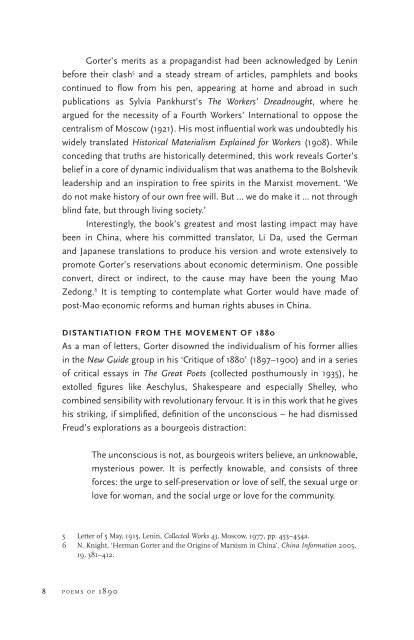You also want an ePaper? Increase the reach of your titles
YUMPU automatically turns print PDFs into web optimized ePapers that Google loves.
Gorter’s merits as a propagandist had been acknowledged by Lenin<br />
before their clash 5 and a steady stream <strong>of</strong> articles, pamphlets and books<br />
continued to flow from his pen, appearing at home and abroad in such<br />
publications as Sylvia Pankhurst’s The Workers’ Dreadnought, where he<br />
argued for the necessity <strong>of</strong> a Fourth Workers’ International to oppose the<br />
centralism <strong>of</strong> Moscow (1921). His most influential work was undoubtedly his<br />
widely translated Historical Materialism Explained for Workers (1908). While<br />
conceding that truths are historically determined, this work reveals Gorter’s<br />
belief in a core <strong>of</strong> dynamic individualism that was anathema to the Bolshevik<br />
leadership and an inspiration to free spirits in the Marxist movement. ‘We<br />
do not make history <strong>of</strong> our own free will. But … we do make it … not through<br />
blind fate, but through living society.’<br />
Interestingly, the book’s greatest and most lasting impact may have<br />
been in China, where his committed translator, Li Da, used the German<br />
and Japanese translations to produce his version and wrote extensively to<br />
promote Gorter’s reservations about economic determinism. One possible<br />
convert, direct or indirect, to the cause may have been the young Mao<br />
Zedong. 6 It is tempting to contemplate what Gorter would have made <strong>of</strong><br />
post-Mao economic reforms and human rights abuses in China.<br />
DISTANTIATION FROM THE MOVEMENT OF 1880<br />
As a man <strong>of</strong> letters, Gorter disowned the individualism <strong>of</strong> his former allies<br />
in the New Guide group in his ‘Critique <strong>of</strong> 1880’ (1897–1900) and in a series<br />
<strong>of</strong> critical essays in The Great Poets (collected posthumously in 1935), he<br />
extolled figures like Aeschylus, Shakespeare and especially Shelley, who<br />
combined sensibility with revolutionary fervour. It is in this work that he gives<br />
his striking, if simplified, definition <strong>of</strong> the unconscious – he had dismissed<br />
Freud’s explorations as a bourgeois distraction:<br />
The unconscious is not, as bourgeois writers believe, an unknowable,<br />
mysterious power. It is perfectly knowable, and consists <strong>of</strong> three<br />
forces: the urge to self-preservation or love <strong>of</strong> self, the sexual urge or<br />
love for woman, and the social urge or love for the community.<br />
5 Letter <strong>of</strong> 5 May, 1915, Lenin, Collected Works 43, Moscow, 1977, pp. 453–454a.<br />
6 N. Knight, ‘Herman Gorter and the Origins <strong>of</strong> Marxism in China’, China Information 2005,<br />
19, 381–412.<br />
8<br />
p o e m s <strong>of</strong> <strong>1890</strong>


